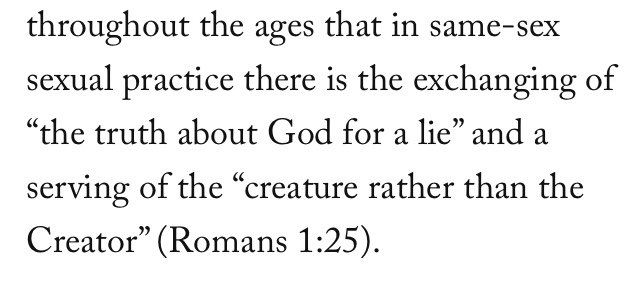I finally read the ACNA document today and have appreciated the responses from others on this website.
It really seems to me like it rests on a fundamental incoherence (which stands among plenty of other problems that others are better equipped than I to address)
It really seems to me like it rests on a fundamental incoherence (which stands among plenty of other problems that others are better equipped than I to address)
The incoherence is this: it claims to be a pastoral document that listens to gay Christians (and I take that at face value), but then tries to preserve a heteronormative understanding of sexuality based on Romans 1. I just don’t see how you do both. The result is a mess.
The document reframed Paul in a very misleading way, using a vague passive voice. They clearly want to be able to use this verse to talk about gay Christians w/o taking full responsibility for what such use would entail.
Paul never says when we have sex in a certain way it exchanges the truth of God for a lie; he says that an initial exchange of truth for lie leads God to give people over to various lusts and unnatural acts.
Paul is not talking here about Christians who pursue the truth of God.
Paul is not talking here about Christians who pursue the truth of God.
The ACNA, like most non-affirming Christian groups that have even a modicum of pastoral care and good sense, know that gay Christians are just that... Christians, pursuing discipleship and obedience to God.
This is why Romans 1 can’t be applied rightly here, and so the ACNA bishops end up applying it wrongly in holding together their pastoral aims and their biblicism.
Whatever Paul is condemning in Romans 1, it can’t be a group of people who are actively seeking the truth of God.
Whatever Paul is condemning in Romans 1, it can’t be a group of people who are actively seeking the truth of God.
That is, it can’t be gay Christians. The logic of ACNA becomes viciously circular, though, because if certain sexual practices are (contrary to the words of Romans) what exchange the truth of God for a lie, then the witness of gay Christians would be a counterfeit witness.
The document says that gay Christians need to drop the “gay” adjective, which is bad enough, but the subtext is actually this: if you are gay, you need to drop the “Christian” identity.
This circular logic has been with ACNA from the beginning, of course. They did not break with Canterbury b/c of sexuality, but rather b/c Canterbury abandoned the Gospel. But how do we know that? ...well... b/c of their stance on sexuality, of course!
This is a logic that I used to operate under. I am published in a canon law journal making this exact, incredibly self-referential argument in defense of a constitutional revision of a non-affirming Anglican province.
It was over 12 years ago and for years now I’ve realized how problematic it was. I think the lust to control the discourse of orthodoxy within pastoral contexts is just that powerful, that this logic seems compelling. But it twists scripture and the witness of fellow Christians.

 Read on Twitter
Read on Twitter


